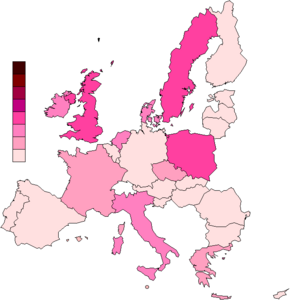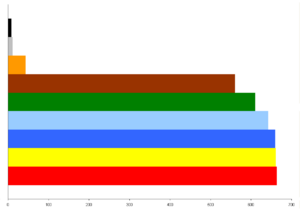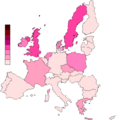Independence/Democracy facts for kids
Quick facts for kids Independence/Democracy |
|
|---|---|
| European Parliament group | |
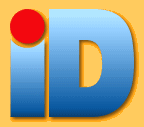
IND/DEM logo
|
|
| Name | Independence/Democracy |
| English abbr. | IND/DEM |
| French abbr. | IND/DEM |
| Formal name | Independence/Democracy Group in the European Parliament |
| Ideology | Euroscepticism |
| Political position | Right-wing |
| European parties | EUDemocrats |
| From | 20 July 2004 |
| To | 1 July 2009 (de facto). |
| Preceded by | Europe of Democracies and Diversities |
| Succeeded by | Europe of Freedom and Democracy |
| Chaired by | Nigel Farage Hanne Dahl |
| MEP(s) | 37 (20–23 July 2004) 28 (January 2007) 22 (24 June 2008) 18 (11 June 2009, de facto) |
| Website | http://indemgroup.org/ |
Independence/Democracy (IND/DEM) was a group of politicians in the European Parliament. These politicians were called Eurosceptics. This means they questioned or did not fully support the idea of the European Union (EU). The IND/DEM group was active from 2004 to 2009. It was a follow-up to an older group called Europe of Democracies and Diversities (EDD).
The IND/DEM group ended after the 2009 European Parliament election. Many of its members, called MEPs, were not re-elected. A new group, Europe of Freedom and Democracy (EFD), took its place for the next term.
Contents
History of the IND/DEM Group
The 2004 European Parliament elections were good for parties that questioned the EU. About 37 MEPs joined together to form the "Independence/Democracy" (IND/DEM) group. These MEPs came from different countries like the UK, Denmark, France, Italy, and Poland. This new group replaced the "Europe of Democracies and Diversities" (EDD) group.
One UKIP MEP, Ashley Mote, did not join IND/DEM. He was removed from his party before the group formed. Later, he joined another group.
Some MEPs from Italy's Northern League left the group after a disagreement. Members from the League of Polish Families also left at different times.
By June 2008, the IND/DEM group had 22 MEPs.
After the 2009 European Parliament elections, only 18 IND/DEM MEPs were elected. This was not enough to form a proper group in the European Parliament. Most of these MEPs (thirteen) were from the UK Independence Party. Others were from the Netherlands and Greece.
On July 1, 2009, the remaining IND/DEM members joined with parts of another group. They created a new group called Europe of Freedom and Democracy. This meant the IND/DEM group officially stopped existing.
How the IND/DEM Group Worked
Different Views Within the Group
The IND/DEM group brought together MEPs with two main ideas about the EU.
- Some were "Eurorealists." They believed the EU was a good idea but needed big changes. They wanted more openness and control over the EU's rules.
- Others, especially from the UKIP, believed the EU was wrong even with changes. They wanted their countries to leave the EU completely.
How the Group Was Organized
The IND/DEM group had two main leaders, called co-chairs. These were Nigel Farage and Hanne Dahl. Nigel Farage represented the MEPs who wanted to leave the EU. Hanne Dahl, and before her Kathy Sinnott and Jens-Peter Bonde, represented those who wanted to reform the EU.
The group's leaders allowed members to have different views. They all agreed on the main goals of democracy and openness. A team of staff, called the secretariat, handled the daily tasks of the group.
Who Were the Members?
Members Elected in 2009
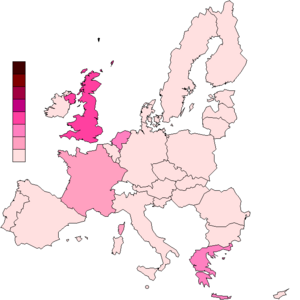
| no MEPs 1% to 5% 5% to 10% 10% to 20% 20% to 30% 30% to 40% 40% to 50% 50% plus |
After the 2009 European Parliament election, 18 IND/DEM MEPs were elected. This was too few for the group to continue. Here is where they came from:
| Member state | Party | MEPs |
|---|---|---|
| United Kingdom | UK Independence Party | 13 |
| France | Libertas France | 1 |
| Netherlands | ChristenUnie – SGP | 2 |
| Greece | Popular Orthodox Rally | 2 |
Members in July 2008
Here are the parties that were part of IND/DEM in July 2008:
| Member state | Party |
|---|---|
| United Kingdom | UK Independence Party |
| Denmark | June Movement |
| France | Movement for France |
| Netherlands | ChristenUnie – SGP |
| Greece | Popular Orthodox Rally |
| Sweden | June List |
| Czech Republic | Independent Democrats |
| Poland | League of Polish Families |
Members When the Group Started (July 2004)
The IND/DEM group started with MEPs from these countries and parties in July 2004:
Member state |
MEPs |
Party |
MEPs |
Notes |
|---|---|---|---|---|
| Ireland | 1 | Independent | 1 |
|
| United Kingdom | 11 | UKIP | 11 |
|
| Denmark | 1 | JuniBevægelsen | 1 |
|
| France | 3 | Mouvement pour la France | 3 |
|
| Italy | 4 | Lega Nord | 4 |
|
| Netherlands | 2 | ChristenUnie – SGP | 2 |
|
| Greece | 1 | LAOS | 1 |
|
| Sweden | 3 | Junilistan | 3 |
|
| Czech Republic | 1 | Nezavisli | 1 |
|
| Poland | 10 | League of Polish Families | 10 |
|
What the IND/DEM Group Did
Key Actions and News
The IND/DEM group was involved in several activities. They tried to make the European Parliament more open by allowing it to be filmed. They also questioned the actions of the President of the European Commission, José Manuel Barroso.
The group argued against important EU agreements like the Constitution Treaty and the Lisbon Treaty. They believed Europe should not become too deeply united. They also wanted more control over the European Commission by the Parliament. They supported making lobbying information public.
How Active Was the Group?
The European Parliament tracks how active each group is. The chart shows how many motions (proposals for action) each group participated in. From 2004 to 2008, IND/DEM took part in 43 motions. This shows they were one of the less active groups during that time.
Publications by IND/DEM
The IND/DEM group also published documents. The Prague Declaration in 2005 stated their dislike for the Constitution Treaty. The Delphi Declaration in 2007 made similar points about the Treaty of Lisbon. They also published a newsletter called EU Watch. This newsletter shared their views on EU activities, often questioning them.
Images for kids
-
IND/DEM percentage of MEPs by member state December 2007 (see description for sources)
 | Stephanie Wilson |
 | Charles Bolden |
 | Ronald McNair |
 | Frederick D. Gregory |


